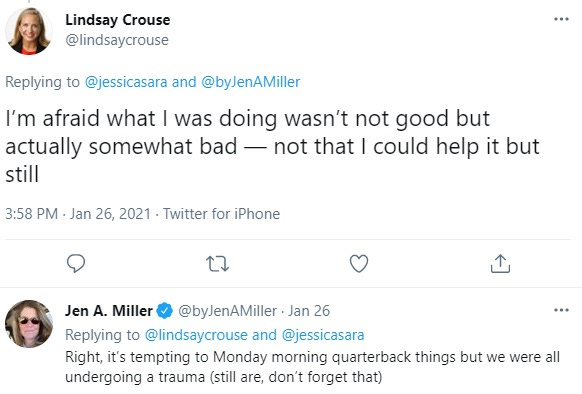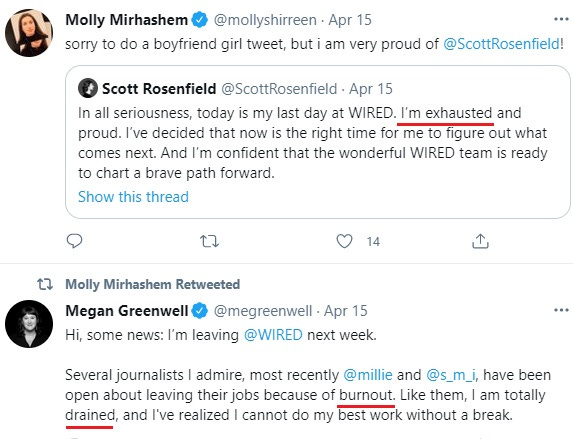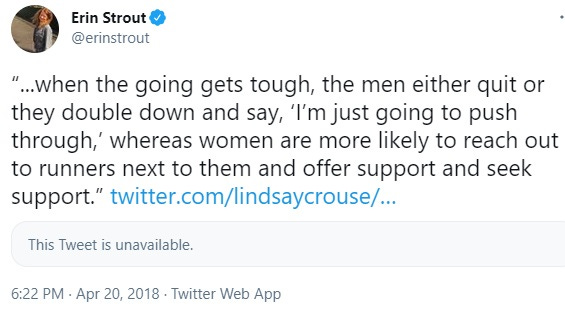Why are women runners with great media gigs so chronically defeated? (1/2)
Consciously telling a fib is, or at least should be, uncomfortable. Lying as a career and life strategy is bound to be exhausting, even for small cogs in a huge, dumb machine
“Nothing is so common as the desire to be remarkable.”
— Oliver Wendell Holmes
In handing off The New York Times version of a running newsletter to methodical propagandist Talya Minsberg, Jen A. Miller offered comprehensive farewell letters on Instagram and Twitter; in the spirit of the times, these were filled with assurances to thousands of potentially frantic social-media fans that everything was fine, better than ever in fact, that she has more work than she can handle. As the author of a book on making solid money as a freelancer—and seriously, good for her for that—she probably should express ideas like these.
She added that, no, she won’t be starting a Substack. Writers and editors associated with The New York Times are obligated to deride Substack for the simple reason that a number of high-profile left-leaning journalists have bailed from corporate media and are now busy on Substack exposing the rank fraudulence of the NYT, CNN and MSNBC, along with various Wokish figures and their flagrancies. (If those in the NYT rats’ nest are not above excreting fake stories even about the death of a U.S. Capitol law enforcement officer—and, as anyone should be, I was pissed off to learn I’d been led to believe this myself without paying much conscious attention to those Capitol-chaos stories in real time—it should be no wonder that someone naturally blessed with a sociopathic approach to journalism like Lindsay Crouse feels free to lie with impunity in a section of the paper that very few people read, including most runners.)
Miller, fittingly, was inspired by Crouse’s fabricated comeback story as well as the running Crouse did in the months before that directly contradicts that story (Schrödinger’s props?), and is another running-writer who has risen to the ranks of an NYT contributor despite framing every unplanned life disruption or restriction as either a crisis or the traumatic effects of one, and every completed run as a triumph over the withering grind of inertia. (Whatever fun I’m having at the expense of Miller’s snowflakey exterior, she’s earned the right to be called a hard worker.)
It seems odd that Miller expects someone who throughout COVID-19 has kept a well-paying job that allows her to spread lies and personal fantasies to the public, all under the flimsy guise of a put-together career woman to associate this experience with being traumatized. And while it’s not clear who “we all” here refers to, but the odds are it ain’t us*.
Molly Mirhashem, the Outside editor who has done her best to keep up with the rest of running’s power-harpies (especially in the anti-white racism department) shares the fair NYT damsels’ fixation on just wearing the fuck out from the backbreaking work of staring at a screen and wondering how to recast what’s there into the most obnoxiously stupid meta-feminist idea possible. And it might literally be catching.
And because I pride myself on thoroughness:
At some point after I started working on this post, Matt Taibbi made a similar observation about the same general cohort of writers. Taylor Lorenz is a rising star in the NYT newsroom thanks to her unusual level of shamelessness and overall putridity.
Only ten years ago, in handing over a low-level running newsletter that was probably a money-sink to a different neurotic, someone like Jen A. Miller (including the other 25 Jen Millers) probably would have felt no obligation to go into great detail about how comprehensively comfortable she was—especially in the same online environment where she and most everyone she associates with constantly talk about being beaten by life to a pulp.
Certainly, the immediacy and increasing popularity of Twitter et al. are the reason we see so many of other people’s formerly private thoughts. But why is it that the people most eager to exemplify how others should think and behave, and are doing exactly what they apparently want to do in life, exude so much defeatism in their everyday communiques?
Wokish white females attribute their “mysterious” ennui solely to external factors: COVID-19, white people who have penises that they acknowledge on questioning, the constant theme of weight in the media that they themselves relentlessly pound away at Twitter-wise more than any other peer group (and I don’t think it’s close).
I have a slightly different theory. To the extent these sundry complaints of fatigue and malaise are not just more bullshit from paid and volunteer bullshit-merchants, I think it has to be exhausting to constantly lie full-blast about the state of the world, the state of yourself, or both, often in ways that purposefully bring grief to undeserving others. Even someone who enjoys being the center of electronic attention by whatever means necessary has to feel guilty over this between logins, especially the ones who appear powerless over the stupidities and conflicting ideas their fingers blurt out.
Unless you have no conscience whatsoever, you can’t make up accusations about events that never happened and call for someone’s head over them without feeling at least some remorse, even if you’re part of a feckless mob. You can’t tweet constantly about trying to shrink yourself through running for the supposed benefit of men and carry on as a mentor to the size-obsessed without at least some kind of twinge.
Also, while purely egoistic behaviors get a less damning moral score than willful misrepresentations of other people and events, the manic insistence on these women of projecting sublime capabilities on every front is also dishonest, and therefore almost certain to lead to “tiredness” in any mind capable of sufficient introspection to discern internal conflict. Everyone knows how enervating it can be to show the world a positive face under duress; many people, like food servers and flight attendants, have to perform this emotional labor as part of their jobs.
Even among those who do good journalism, it’s got to be tiring to portray yourself on social media as being at the top of your game, all the time—especially when your litany of complaints in the same spaces underscore the opposite. And when someone actually alternates between “I have the world by the balls!” and “Ouch! Stop crushing my nuts!” tweets in the same day, or even the same hour, they shouldn’t be surprised to learn that everyone can see it’s a façade, and that this affinity for chronic misdirection is part and parcel of their “journalism.”
People notice when someone is yelling “Look at me—I have the answers!” while simultaneously bemoaning being so buffeted by the winds of the grind that merely lacing up a pair of running shoes is a chore worth seventeen pages of Ayn Rand at her most insufferable. It invites both a hard look not just at their professional work but at why such people are in journalism at all, as it’s not a good fit for self-absorbed fabulists with whole shipping crates full of unprocessed issues and attendant butthurt.
This is evident in running influencers and running journalists forming a unified victimhood front. While the influencers rely more directly on this tactic for donations, the bad journalists use it to shield themselves from rightful upset over their lies.

The above is pure deflection in response to Glenn Greenwald’s expose of Natasha Bertrand, yet another female menace to the profession whose ghastly output makes Fox & Friends look like a discussion about the origins of the universe by world-renowned cosmologists.
But—and I will be more stringent and unpleasant about this until someone starts providing answers or alternative theories—I maintain that all originates in being pissed off that people faster, more talented, or better-looking than themselves are more widely appreciated and more objectively successful in life, which is kind of how the world generally works. Unless, that is, you can get away with systematic bullshitting as a substitute for these qualities.
On the influencer side, you may remember Latoya Shauntay Snell, aka “The Fat Chef,” the deeply unreliable and tempestuous grievance factory who served as last November’s Runners World “anti-harassment cover gal—a relationship that soured when it turned out Snell was far more interested in cash than in being a voice for the oppressed.
Snell, who has run all of 7.6 miles in 2021, has a recent Instagram feed that, pictorially, resembles the "intimate wear" section of a 1980s-era J.C. Penney catalog as imagined by Stephen King. Editorially, it’s an ongoing complaint and an amazingly long list of medical and social maladies, chief among them mean people who don’t like her unapologetic bullshitting. Snell will keep doing this for as long as companies like HOKA ONE ONE reward her for it, so I don’t really blame her. But I wonder if Runners World will do a “Where are they now?” feature at some point to see how its crew of anti-harassment women are doing with their running and personal campaigns, Wokish and genuine alike.
Tomorrow I’ll post the second half of this, which is more exploratory than revelatory. It will be nice; I think you’ll all enjoy it.








